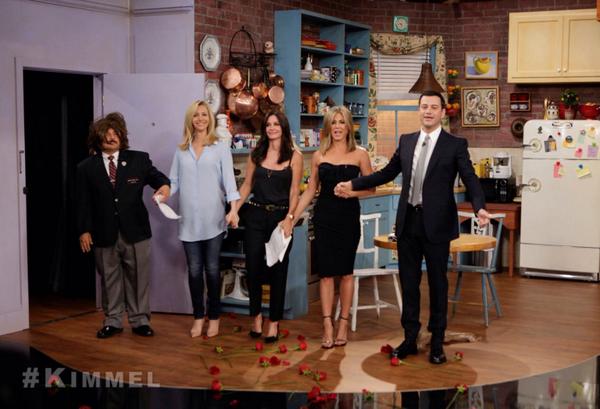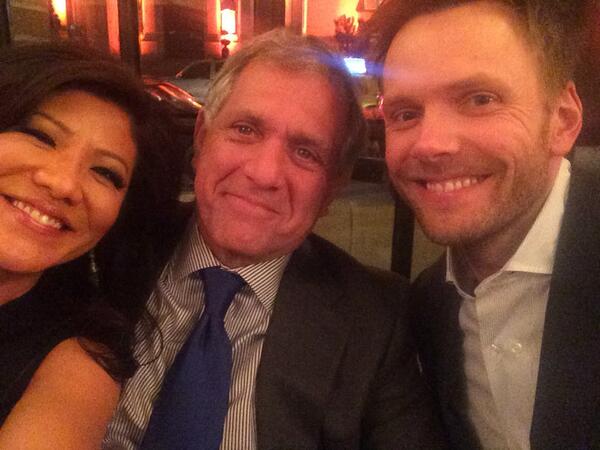Whether you want to see David Letterman or tell jokes on his TV show, your gatekeeper remains the same. Paging Eddie Brill!

That’s because Brill has two jobs on The Late Show with David Letterman,
warming up the live audiences at Letterman’s Broadway "Ed Sullivan" theater each weeknight, then also booking the comedians who perform on the late-night TV show. The first part is easy, Brill says. "We’ve got it down to a science," he says. "It’s like hosting. You’re an emcee. Our whole job is to take an audience that is not cohesive and cohese them. That’s the best way to describe it."
How much of a science is it? Watching it unfold is, well, literally, clockwork. Eighteen minutes before the hour, Brill bounds onstage with the microphone, says hello and introduces a hilarious classic clip of Letterman working the Taco Bell drive-thru to get the crowd in the right frame of mind, and remind them about just who they’re here to see. Then Brill gets a few minutes to warm up the crowd, joking about New York City and how much Times Square has changed in recent years. Examples: We now have an Applebee’s, we no longer get to play the Adam’s Apple or Not game. "That game’s gone," Brill tells the audience. Within a few minutes, it’s time for announcer Alan Kalter to take the stage and Brill introduces the band members one by one. The band plays. Here comes Paul Shaffer. Then Letterman himself leaps into the picture, riffs on whatever is on his mind, takes a question, and away we go. Whiz, bang, boom. Time to start the show."The whole thing about it is being positive and letting them know exactly what they’re going to see and let them know they’re a very important part of the show," Brill says. "We want them to be involved. They’re our soundtrack."
Brill recalls a recent weekend in Atlanta at the Punchline in which he and the other comedians on the bill had varying degrees of success with the audience. "First show on Friday, everybody felt out of sorts, none of us felt like we’d connected," he said. "But the second show was magical. Everything was clicking."
On the weekends or when Letterman is in reruns, Brill is on the road, traveling the globe performing in comedy clubs and scouting new talent. "I probably do 20 to 25 showcases a year," Brill says. "Clubs will let me do a showcase of comics when I come in to work the club. I work all over the world, and I’ll be able to see comics from that country. That’s very helpful to me."
A veteran stand-up comedian himself, Brill has worked with the Late Show for more than 11 years, booking comedians for the show since March 2001. How has his job impacted his relationship with his fellow comics? "I had already booked a comedy club in New York in the 1980s," he says. "Knowing what it’s like and being a comedian whose dream was to do the Letterman show, I was aware of that, so I made myself very approachable. And I’m also very honest with the comedians." He can see the difference in how comedians treat him publicly. "The good thing is, people respect my stand-up, and that kind of helps," he says. "The weird thing is, I have to say ‘No’ 99 percent of the time."
Thousands of comics ask and beg to get on the show, but Brill only had 15 slots to hand out each of the past two years. His best advice for comedians looking to get on the show? First of all, you’ll need poise to make it on TV. Be smart. Be clever. Comics also need to know that while profanity might get them laughs in the club, it’s never going to fly on network television. "All I know is that it’s not the Eddie Brill show, it’s David Letterman’s. So I have to book comedians that make David laugh, the style he wants on the show. He wants material-based comedians. The real one-of-a-kind, one-of-an-art comics," he says. "Not the most popular comics. If a comic is very popular
that’s a bonus, but most times, that doesn’t match."
What common mistakes do comics make when trying to impress you?
"Mistakes? A comic just cursing all the time, like the one we were at in Washington, D.C. (the industry showcase for the DC Comedyfest). Or a comic not really preparing for a set that can be seen on television," Brill says. "A lot of comedians make the mistake of rushing and trying to
fit as much material in as they can and that works against them. The ingredient I’m really looking for is poise, and if you’re rushing, it really comes across as unnatural."
Does that mean you have to be, as they say, TV clean? "We want someone who is clever. You can be a little bit racier onstage and still do a set on Letterman. Jim Norton, Nick DiPaolo. Those kinds of comedians have done well on Letterman."
How has the landscape changed for comedians looking for their big break now versus when you started? "Nowadays, the opportunities are really there for comedians to be really uncensored on the Internet and YouTube," Brill says.
Is there that same make-or-break opportunity for comics today that’s comparable to doing Johnny Carson’s Tonight Show a generation ago? "There wasn’t six shows going on in the same timeslot. Everyone was watching Carson. Everyone watched what Johnny said. So that’s the way it was with Johnny. It’ll never be that again," he says. "Last Comic Standing does a lot more for comedy than anything else on TV, because the exposure is huge. It’s unfortunate, because the winner often isn’t the best comedian in the country. They may have marketed themselves well. But there isn’t one Last Comic Standing winner that I’d put on Letterman because their material isn’t unique enough. But Kathleen Madigan and I were talking, and the exposure you get on that show is incredible…Comics who probably couldn’t sell any tickets can sell out major venues because of Last Comic Standing…Comics who were middle slots…But that has always been the nature of the beast."
How would you change LCS if you could? "I would take it off television," Brill says, laughing. "No. Replace it. I would like to see less and less competition, and more and more appreciation of the art. We would have real judges who give them constructive criticism. If it can be a real learning experience, it would be great. But these shows are just manipulations of talent. They’re trying to get so many people to buy stuff during the commercials."
Brill stops to mention joke theft, which is a big issue within the comedy community, but as far as the industry is concerned, so what, right? Case. In. Point. "If a comic steals material, everyone’s angry, but who’s the only one who cares? Comics," he says. "Everyone accuses Carlos Mencia of stealing jokes, but does it stop him from selling tickets or being on TV? No. And, in fact, Joe Rogan, the guy who has the guts to out him, was treated as the bad guy."
"But I don’t lose sleep over Last Comic Standing. I applaud all the comics, and even bad television gets the comedy business known," he says. "That’s the great thing about the Letterman show. We have the ability and the forum to put on the real artists. And that’s the coolest thing about my job. If they’re not funny, he doesn’t want them on the show."
And as Brill readily admits: "The last thing I’d want to do is be a sell-out, but I’m not turning down a $25,000 check to work a corporate function, so that’s just the way it is."
And, in fact, Brill did participate in a televised comedy competition. So he has seen it up close and personal, as the say. "I was on the older version of Star Search, and what I
realized about those shows, was they were game shows. We were under the impression
that they were fixed, with the old ones, was that they manipulated the outcome…I saw John Mulrooney lose to Sue Kolinsky. I saw Frank Santorelli lose to Jason Stuart. And both of those were complete miscarriages of justice. I was there for the taping of Frank Santorelli and he destroyed. And Jason Stuart didn’t do very well. And then they announced the results, the audience gasped. When they showed the tape back, Frank’s set was cut by 20 seconds and they added applause to Jason’s."
Did the newer version of Star Search fix those issues? "One of the problems with the newer one is they had a manager who booked comedians on the show," he says. "Managers should not be booking these shows."
At least they don’t have that problem with Last Comic Standing! Ahem. Barry Katz. Ahem. Moving on.
"One of the cool things about comedy is you get to tell the
truth. Our society is so based on rationalizing the lies that it’s such a refreshing
endeavor to be a stand-up comedian. It’s the one place where you can go to tell
the truth," Brill says. "People are always ready to laugh, because people take life
seriously. People are so shackled by the lessons we learn in our childhood. Be
the same. Color inside the lines. All that stuff that makes us so wracked with
guilt and fear. It always makes us feel good to laugh and just let go."
Brill recently helped launch the Great American Comedy Festival this summer in Johnny Carson’s hometown in Norfolk, Nebraska. "I was very excited about the Johnny Carson festival. It was
wonderful to be able to honor one of the greats in our business. It now has a
life of its own. It’s become a yearly thing. We’re already working on next
year’s," he says. How did the middle of Nebraska take to having a comedy festival? "The one thing that Norfolk…they
don’t really have a big comedy situation there. A lot of times you train an
audience. If you tell the audience a show starts at 8 and it starts at 8:15,
they start coming in at 8:12." What this means, exactly? "We’re not showing them crap. We’re only showing them the
real high-end stand-up comedy, so that’s all they know, and it’s a beautiful
thing."
A shorter version of this interview appears in today’s New York City editions of the free Metro newspaper. Eddie Brill performs with other Hot Comix on Wednesday at Comix in NYC. Tickets and info here. You can also see Brill this weekend, Aug. 29-31, in Denver at ComedyWorks. Info here.


